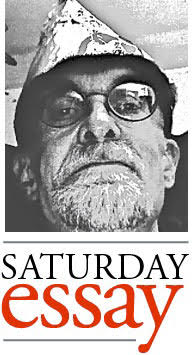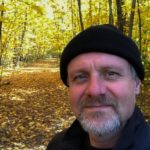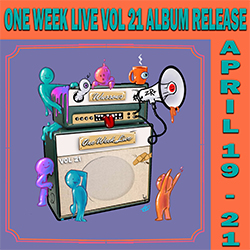Nature Always Bats Last
 Blood and bone, rivers and stone, are all of a piece, you see. For millennia we knew this, knew we belonged to the Earth, until some tinhorn prophet came along boasting the Earth belonged to us, a gift from God, of course, of which we’d be good stewards, of course, then all things holy left us, last seen heading skyward, and magic absconded on angels’ wings, up, up and away.
Blood and bone, rivers and stone, are all of a piece, you see. For millennia we knew this, knew we belonged to the Earth, until some tinhorn prophet came along boasting the Earth belonged to us, a gift from God, of course, of which we’d be good stewards, of course, then all things holy left us, last seen heading skyward, and magic absconded on angels’ wings, up, up and away.
So how’s that working out? Still waiting on the Second Coming, the Third Temple, the Fourth Horseman of the Apocalypse? Still telling old stories which buried stories older still? Tall tales of a bronze-age god who smote the competition. He himself quite recently smote by the Enlightenment and science. Yet, though we now know the Aurora Borealis is lit by particles, not spirits, mystery abides, and it carries us without needing us while we are needing stories.
Mystery abides. Our planet and the depths of space are but its outward face. Though bits of life itself have been patented for sale, we don’t understand what we’re messing with. As Cat Stevens sang, “The soul of nobody knows / how a flower grows.” We may know chlorophyll and hemoglobin molecules are within a few slim atoms of identical — all the green in nature so close in composition to our own ruddy animal blood, and we can manipulate both until Frankenstein’s monster seems like the boy next door, but mystery abides and it’s going nowhere, whichever new sherif’s in town.
We know monarch butterflies navigate by way of internal “sun compasses” and circadian clocks. They leave the oyamel fir trees of central Mexico and the first generation travels several hundred miles and lives several weeks. They lay their eggs on milkweed then the next generation hatches and continues north. The fourth or fifth generation makes it to its final destination in the U.S. and Canada, and here a “super generation” will be hatched, which will live up to eight months and fly the entire 3,000 miles home to those same trees in Mexico at the end of summer. Scientists have mapped the anatomy of monarch brains to an astounding degree yet their migratory instincts spring from something unknown and perhaps unknowable. Such is the abundance of nature and such is our nonchalance in the face of mystery that wonders like these are mere trivia, best left to the woo-woos and geeks.
The king of the beasts is not the lion, but we opposable-thumb big shots. We can’t echolocate like bats or see at the sub-atomic level like bees or communicate across thousands of miles of ocean (without electricity) like blue whales, but the powers of language and reasoning emanating from that most complex structure in the universe — our human brain — has enthroned us at the top of the heap. Yet natural selection is slow, outpaced by our technology. We won’t be revealed as an evolutionary dead-end until the damage we’re doing is done. Some among the kings of the beasts sense a revolution is brewing, and our dethronement eminent, but until now our evolution hasn’t required thinking globally or into the distant future. Native peoples considered the seventh generation, and knew their (our) place on this Earth, but once someone’s family and mortgage payments are dependent on burning fossil fuels, or someone has a vested interest in injecting proprietary poisons into the groundwater, our inherent supply of altruism is not enough to go around. We animal sovereigns share 96 percent of our genes with chimpanzees. We’re monkeys with nukes, disregarding our nature, but nature always bats last.
My Webster’s dictionary first defines nature as “ the essential character of a thing” and down the list of definitions gives its theological meaning: “the state of man unredeemed by grace,” which suggests a dim view of both us and nature. Blind Willie Johnson sang, “Won’t somebody tell me / answer if you can / won’t somebody tell me / what is the soul of a man?” Well, Webster’s won’t say and I, with my unredeemed essence, don’t have a clue. Willie’s gospel-blues koan baffles us still. What lights the candle in our jack-o-lanterns? Who haunts the twinkle in our eye? What plots the stories of our dreams, if not some force of nature?
In our culture “mystery” most commonly refers to fiction of the “who-done-it?” variety. But the real brain teasers are to be found in nonfiction of the “what-the-hell-is-going-on-here?” variety, where wonders never cease and nothing is resolved and we’re in over our heads so we might as well get used to it. And science only whets our appetites. There is not only the Big Bang theory, which postulates that all the mass and space-time of the universe once existed in a singularity of infinite density, there is also a Big Bounce theory, which suggests a cyclic creation story where the death of one universe births the next. But here’s the deal: If such a singularity existed, it’s not known how or why it originated. To even the smartest of the smart people what came before the Big Bang 13.7 billion years ago is a mystery. Einstein said, “the circumstance of an expanding universe is irritating.” As may be my pointless pondering. But here we are surrounded and sustained by forces beyond our imagination, with our cultural evolution influencing biological evolution, and our stories, whether they be the mythologies of ancient desert tribes or the fables of late-stage capitalism, aren’t doing the trick. What, indeed, is going on here?
My own worldview is essentially faith-based. That is, I have faith in other people who are smarter and more educated than I doing repeatable experiments to help explain the world. And I have faith in nature, if not in its inherent kindness toward, or interest in, my sorry ass. I also harbor superstitions about an intelligence permeating all of that nature — of mind with a capital M existing beyond the confines of our physical brain. And I trust that because I was born, dying is a natural part of the program and nothing to fear. I must also embarrassingly confess I sometimes offer agnostic prayers of thanks to the forces that may or may not exist, not so much to hedge my bets but because I feel grateful and have an urge to thank my lucky stars, so to speak.
So we found ourselves a planet a comfy distance from the nearest lucky star. A planet with a molten core and a gravitational field that holds onto our atmosphere, which itself holds in heat and wards off radiation from space. Then came the chicken or the egg, the protein or the RNA, scientists still don’t know. Natural selection somehow got rolling and over the course of 4 billion years all the myriad, miraculous lifeforms, from bacteria to Beethoven, arose. It’s fun to ask, about anything in particular — “what is the evolutionary value of that?” Why do we see some things as beautiful? Why does sunshine make us happy? Why are some sensations pleasurable? Why do we feel compelled to make sense of all this? Evolution aside, is there any sense to be made? And, lastly, what is this thing we call “mind”? Dogen Zenji said, “Mind is no other than mountains and rivers and the great wide Earth, the sun and the moon and the stars.” Mind is nature? What is going on around here?
Recommended Links:
Leave a Comment
Only registered members can post a comment , Login / Register Here













1 Comment
Helmut Flaag
about 6 years ago